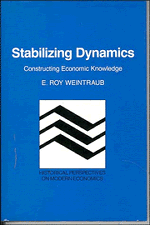2 - Economists on dynamics and stability in the 1930s
from Part I - From dynamics to stability
Published online by Cambridge University Press: 04 August 2010
Summary
The past several years have seen a number of provocative studies of the 1930s, studies that suggest the complexity and richness of the theorizing about economic dynamics. Mary Morgan (1990) showed that the early econometricians were grappling with the nature of dynamic models in order to rationalize empirical work. Kyun Kim (1989) indicated how the various models of business cycles produced in the 1930s came to be submerged by the Keynesian onslaught. The earlier heroic story, as told, for example, in Shackle's The Years of High Theory (1967), seems terribly oversimplified today.
The historian of economic thought, usually trained as an economist in present-day economics, naturally sees the past from the present and so reads past texts against the background of current best practice. The Whig history that results is at least comprehensible and can be presented to economist-colleagues as a contribution to current debates, for the historian can assert that the confusions of the present are rooted in the mistakes of the past. As Latour and Woolgar remarked,
historians, as portrayed in historical texts, can move freely in the past, possess knowledge of the future, have the ability to survey settings in which they are not (and never will be) involved, have access to actors' motives, and (rather like god) are all-knowing and all-seeing, able to judge what is good and bad. They can produce histories in which one thing is the “sign” of another and in which disciplines and ideas “burgeon”, “mature”, or “lie fallow”.
[Latour and Woolgar 1979 p. 107]- Type
- Chapter
- Information
- Stabilizing DynamicsConstructing Economic Knowledge, pp. 15 - 38Publisher: Cambridge University PressPrint publication year: 1991



